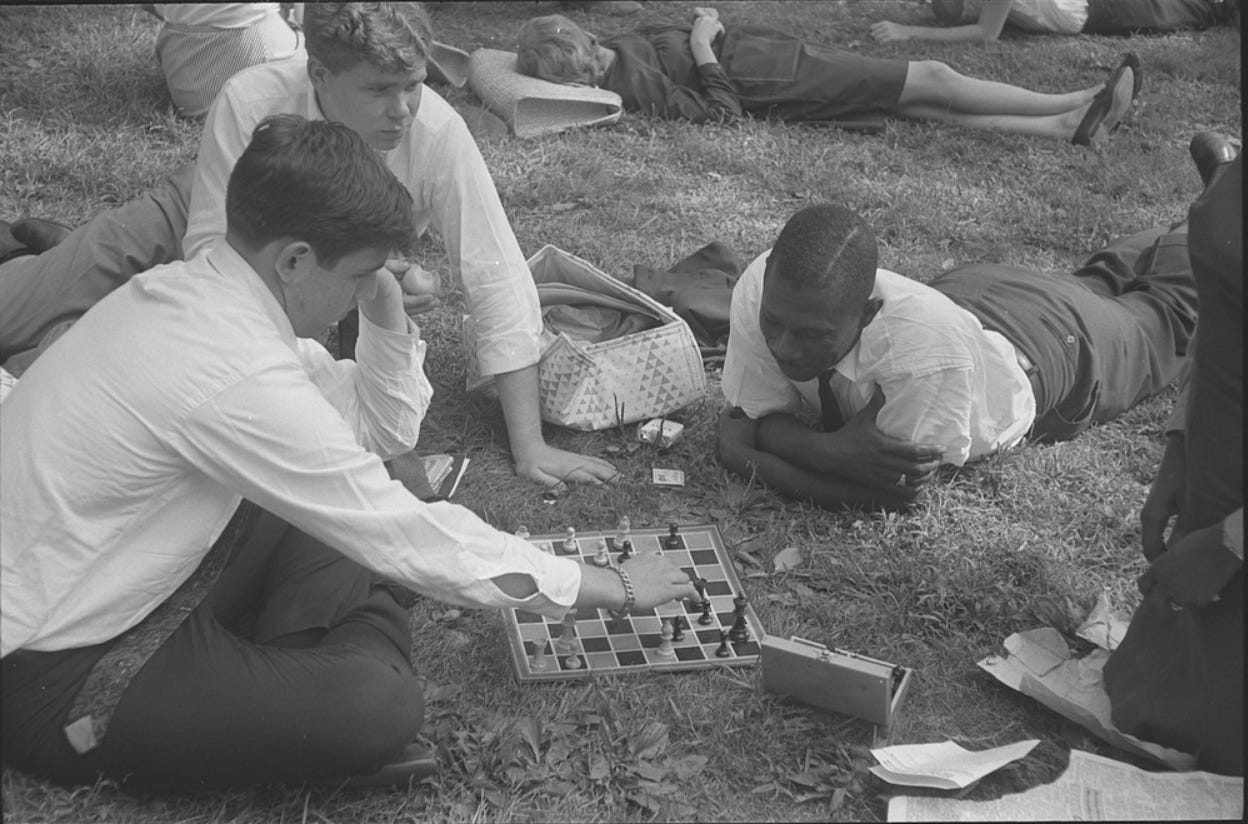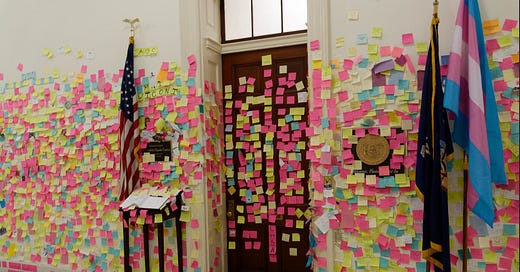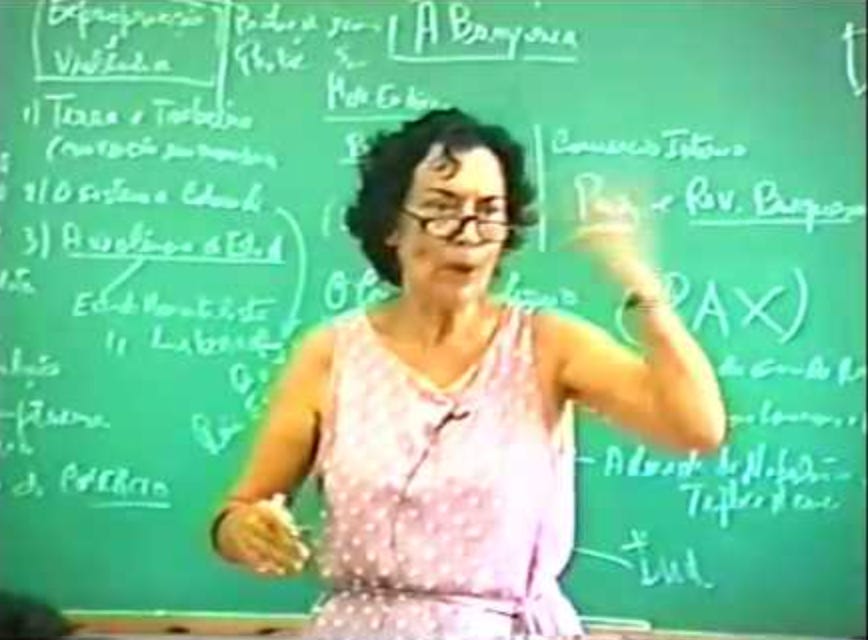


“The weird thing about moments like these is that you lose all sense of time… it felt like my brain was able to have so many thoughts in that moment between the screams and yells of ‘Where is she? Where is she?’... I thought I was going to die… I had a lot of thoughts… I just happen to be a spiritual person… and I just really felt, you know, that if this was the plan for me that people would be able to take it from here. I had a lot of thoughts but that was the thought I had about you all. If this was the journey that my life was taking, I felt that things were going to be OK.”
-Alexandria Ocasio-Cortez, 2021
I don’t know if I’ll ever get over those words, you all.
I don’t know if the force of them won’t ever just pin me to the floor.
These are the reflections of a sitting United States Congressperson, a woman recounting the day that a gang of hyper-reactionary gun thugs stormed her workplace.
These are the reflections of a woman who has spent the lions-share of her post-collegiate life as an object of perverse and vitriolic fascination from a group of people who wish her violent harm.
These are the reflections of a sexual assault survivor- a woman who understands “the compounding power of trauma upon trauma”- recounting the seconds-or-minutes-or-hours that she had to hide in the corner of her office while gruff voices yelled “WHERE IS SHE?”
And yet…
At the moment that she feared- quite reasonably- that her life might be over… she was thinking about you…. she was thinking about us.
I just really felt, you know, that if this was the plan for me that people would be able to take it from here. I had a lot of thoughts but that was the thought I had about you all…
We’ve heard words like that before, which is one reason why they’re so haunting. Take away the next-generation technology platform with its stream of scrolling comments and digital hearts and what you’re left with is MLK’s “I’ve Been To The Mountaintop” speech for a new generation. On one hand, they’re both artifacts from public figures that have had to walk this world under constant threat of assassination. That’s not all though. The reason why MLK was able to stand at Memphis’ Mason Temple and proclaim that “we, as a people, will get to the promised land” and that he no longer “fear[ed] any man” is the same reason why AOC could say that “things were going to be OK” because she knew that others would carry on her work.
MLK wasn’t just a charismatic pastor. AOC isn’t just a social-media-savvy Congresswoman. He was a movement preacher. She is a movement politician. And that distinction matters.
The first-ever World Social Forum was held in Porto Allegre, Brazil in January, 2002. The event brought together grassroots activists from across the globe. There was a tangible sense of excitement in the sticky South American summer air, in no small part because the country in which they were gathering was on the precipice of delivering a major electoral victory to the then-still-radical Worker’s Party and their charming leader, Luiz Inácio '"Lula” da Silva
Given that context, it must have been at least mildly jarring for the crowd to gather for the Forum’s closing plenary closing only to be greeted by Maria da Conceicao Tavares, a profane, septuagenarian Economics Professor. Tavares (who had lived through fascist regimes in both Portugal and Brazil) wasn’t there to deliver a simplistic message of hope, nor to pat any single party on the back for their electoral success. You see, she wasn’t just any economist; she was a movement scholar. And when you hire a movement scholar to give your closing plenary, this is the kind of message they deliver:
“Maybe when you are 20 years old you can believe in revolution, socialism and even the resurrection of the flesh. But have no illusions; the struggle is permanent. I have fought for fifty years and I will continue fighting until I die. That is all I know how to do. And I hope you will join me.”
-Maria da Conceicao Tavares, 2002
Here’s what movement people understand. The forces that divide us, that keep the gears of oppression and division and hatred moving forward, have everything on their side. They have history. They have institutions. They have the money and the guns. For those of us on the top of societal hierarchies, they also have our hearts and minds, to say nothing of our Gollum-like attachment to our home values, our 401k balance and our children’s SAT scores.
What then, do those of us who aspire towards something more beautiful and equitable have going for us? People. Just people. Lonely, scared, fallible, frequently-harm-causing people. We’ve got each other, and we’ve got a finite amount of time and space that we’re in each other’s lives. That’s all.
And it’s in that Recognition Scene moment- when it becomes clear that the only arrow in our quiver is the strength of our collective relationships- that Movement People are forever saddled with and inspired by a single, unceasing question: Why, if those truly are the stakes, would we ever squander a single moment with each other?
Alexandria Ocasio-Cortez isn’t brilliant because she’s a preternatural small-dollar fundraiser or because she’s a skilled retail politician or because we can all live vicariously when she dunks on Ted Cruz. She’s a skilled movement politician because she’s constantly thinking about how to welcome others (particularly the multi-cultural, politically engaged young people who make up her core base) into a lifetime of justice work. It’s why she does all these Instagram Lives in the first place. It’s why she plays Among Us on Twitch (do not be ashamed if you don’t know what those words mean; I may have just typed them but I’m right there with you). It’s why she follows up her viral committee hearing interrogations with explainers about which members of her staff did the behind-the-scenes prep that made them happen. AOC isn’t looking forward to her next election; she is earnestly gauging her legacy on how many people she can welcome into a lifelong struggle for justice.

It pains me to say it, but there are far too few movement people in white anti-racist work these days. I know because I’ve gotten to talk to hundreds of white folks who have been through the trainings and book clubs and affinity chapters that make up our nation’s patchwork quilt of white anti-oppression spaces.
What I hear again and again is that too many of those spaces are more interested in being right, in drawing firm boundaries between the righteous and the depraved than they are in bringing more people into the work and inspiring them to stay for the long-term. They are spaces where language is policed and there is always a correct answer, where “calling out” and “calling in” both carry the same caustic judgment, just at different volumes. They are spaces that congratulate themselves on identifying other white people as being irredeemable, as not being worth-the-time-or-effort. They are under-curious and over-funereal; they’re where we go to project our personal shame onto one another like a never-ending Pong match of self-flagellation and incrimination. Even the kindest and most productive ones often come with the implicit message that it is only through the addition of dozens of hours of (often quite expensive) reading and reflection and unpacking that one becomes worthy of doing justice work.
On one hand, I get it. White people cause harm. Spaces that welcome us in only to allow us to live the rest of our lives without reflection or change will only ferment more harm. But when I think about all the spaces that HAVE challenged me to be a better, less harm-causing person (the Methodist church camps of my youth, the street theater activist groups of my college years, my own family), it was always the spirit of welcome that was foregrounded. The challenge and the call-to-something-more increased only in symbiosis with deepened trust.
Goodness knows I’m a flawed messenger here. Former colleagues know full well that I’ve wasted plenty of time caring more about the sanctity of my own opinion or the power of my hierarchical position than in movement work. I’m learning, though. These days, when I receive the gift of a new relationship with a would-be white anti-racist activist, I hope what I model in practice isn’t an awe-inspiring display of textbook perfect anti-racist language nor a world-shaking Ten Step Organizing Plan. What I hope they experience is an honest curiosity about and delight in them, a genuine sense-of-gratitude that they’ve been drawn to this work and an earnest desire to build the kind of relationship that we both might value enough to return to over the long haul.
None of us are AOC. None of us are MLK. None of us are Maria da Concacaio Tavares. And thank God for that, because that isn’t actually how this works. Movements don’t need millions of us to jockey to be the most prominent outstretched hand. They just need more of us grabbing ahold of the chain and extending it a bit farther.
As always, thanks to you all for being a community for me. If you want to support this work, please consider becoming a Barnraisers Project member. Alternately, if you want to sign up for a spring training cohort, you can learn more and do so here.
This week’s song: The Trapeze Swinger (this version by Peter Mulvey and SistaStrings).





"a genuine sense-of-gratitude that they’ve been drawn to this work and an earnest desire to build the kind of relationship that we both might value enough to return to over the long haul. " Thanks for sharing all of that information and inspiration. This was such a great read, Garrett!
This is so important. We need regular reminders that just because the change doesn’t happen fast and for us, doesn’t mean the fight isn’t worthwhile. It does mean that everyone’s contributions are that much more urgent. 💪💗